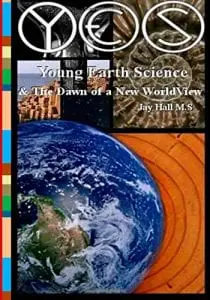In 2006 Abingdon Press (Methodist publisher) put out Can You Believe in God and Evolution: A Guide for the Perplexed by Ted Peters and Martinez Hewlett. They discuss creationism, intelligent design and evolutionary theism. If they follow the example of John Wesley (d. 1791) they will join the ranks of those who believe that creation took place in six regular days and that the Global Flood of Noah’s time was a significant geologic event.
Regarding the Fourth Day of Creation Week, John Wesley comments, “This is the history of the fourth day’s work, the creating the sun, moon and stars.” Note that we have the creating of stars and not just their appearance (as progressive creationists claim). Often it is stated that Genesis tells us the “Who” of creation but not the “How.” In contrast, we read in Wesley’s commentary on Genesis, “The work of creation not only proceeded gradually from one thing to another, but advanced gradually from that which was less excellent, to that which was more so.” The six days of Creation Week go from less complex to more complex. Even the most basic atom is complex if we go down to the quark level.
Wesley comments on the sixth day and the how of creation:
The evening and the morning were the sixth day – So that in six days God made the world. We are not to think but that God could have made the world in an instant: but he did it in six days, that he might shew himself a free agent, doing his own work, both in his own way, and in his own time; that his wisdom, power and goodness, might appear to us, and be meditated upon by us, the more distinctly; and that he might set us an example of working six days, and resting the seventh. And now as God reviewed his work, let us review our meditations upon it; let us stir up ourselves, and all that is within us, to worship him that made the, heaven, earth, and sea, and the fountains of waters. All his works in all places of his dominion bless him, and therefore bless thou the Lord, O my soul [emphasis added].
Wesley said that numerous geologic formations were “doubtless formed by the general Deluge.” [1] Wesley held that the original “very good” creation held no death, disease or destruction. [2] Wesley tells us that at the perfect beginning, “there were no agitations within the bowels of the globe, no violent convulsions, no concussions of the earth, no earthquakes…” [3] Thus, the evidence of death and devastation in the fossil record must be post-Fall. Originally, man and beast were vegetarian (Ge 1:29-30). Wesley comments, “there were no birds or beasts of prey; none that destroyed or molested another; but all the creatures breathed, in their several kinds, the benevolence of their great Creator.” [4] There are many carnivores in the fossil record, so it must be post-Fall. Regarding the Lord’s promise not to send another worldwide flood, Wesley said, “God had drowned the world once, and still it is as provoking as ever; yet he will never drown it any more, for he deals not with us according to our sins.”
The topic of creation was so important to Wesley that he wrote the two volume work Survey of the Wisdom of God in the Creation (1763). [5] Wesley was a creationist and held that creation occurred about 4000 years before Christ. [6]
If I tell you things that are plain as the hand before your face and you don’t believe me, what use is there in telling you of things you can’t see, the things of God? (Jn 3:12, Message)
May your heart also be “strangely warmed.”
Notes:
1) Refuting Compromise by Jonathan Sarfati (Master Books, 2004), p. 130.
2) ibid.
3) ibid., p. 199.
4) ibid., p. 206.
5) The Great Turning Point by Terry Mortenson (Master Books, 2004), p. 42.
6) ibid.
YES – Young Earth Science and the Dawn of a New World View
What is Young Earth Science (YES)? How old is the world? Are radiometric dating methods reliable? Is Darwinism substantiated by scientific evidence and valid arguments? How does the Renaissance of Catastrophism relate to the age of the Earth? Has plate tectonics occurred more rapidly in the past? These and other queries are answered in this exciting new fully documented work. This widely illustrated book features support from history, philosophy, geology, biology and physics. Discover this creative and multidisciplinary approach which provides affirmation that this planet is thousands of years old and not billions . . . (continue reading)









Jay,
Very well presented & succinct.
God’s Word first, last, and always will never lead us astray.
In His Love,
Jack B.
I have a copy of “A Survey of the Wisdom of God in the creation” vol. II, it was bought in 1824 by James Hetherington. Is this a collectable?
Donna:
I’m not sure on that. You might put it on ebay if you are interested in selling it. There may be an antiquarian book shop in your area that you can take it to and get a rough estimate of its value.
Blessings, Jay
John Wesley died in 1791 before the rise of empirical geology (which was pioneered by devout Christians like Adam Sedgwick). I have read his ‘Survey of the Wisdom of God in Creation’, and he hept up to date with the science of his time. But we can say several things about his teachings in this respect:
1. He believed eg that spontaneous generation was an issue to be decided by science not by reading Scripture
2. On science issues he generally took ideas of his time. The fact that his prominent lay preachers may have pracrtised blood letting as amedical cure, or that some of the remedies in Wesley’s ‘Primitive Physick’ are bogus, does not lessen his status as a biblical heologian.
3. One cannot always tell from a sermon how literalistic a preacher is. For example Origen clearly did not believe in the seven literal days (as his ‘First Principles’make clear) but this was not always clear in his homilies or sermons.
Excellent points, Dr. Marston. I will do my best to contact the author of this article for his thoughts, but it is always wise to remember even our favorite Christians are bound to have areas we disagree with.
~Cheri, Creation Club curator
Dr. Marston:
I greatly appreciate your thoughtful comments. As for spontaneous generation, even Aristotle was incorrect on that matter, but this contradicted his other works where he said “like begets like.” Have you read The Great Turning Point by Dr. Mortenson (ref. 5)? He documents the “Scriptural Geologists” of the early 1800’s who defended the Flood via “empirical geology.” I would recommend Coming to Grips with Genesis (Mortenson & Ury) and Earth’s Catastrophic Past (Snelling) for excellent apologetics on the young earth and a global flood. My latest book will help too, Is A Young Earth Possible? (search “young earth possible” on Amazon).